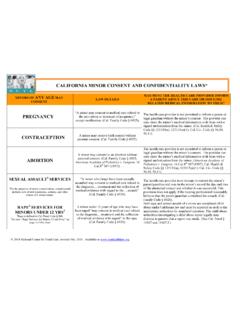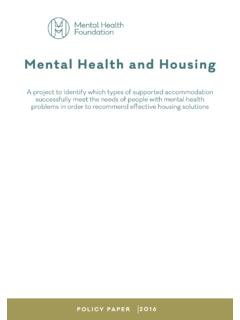Transcription of Specialty Mental Health - chhs.ca.gov
1 OVERVIEW. Our goal is simple: our programs must meet the needs of the children and youth we serve. SYSTEM PROFILE: These are our collective children, and they all deserve the very Specialty Mental Health * best. The Department of Health Care Services (DHCS). administers California's Medicaid program (Medi- We recognize that it is our obligation to ensure that the Cal). The Medi-Cal Specialty Mental Health Services services we are providing are (SMHS) program operates under the authority of a coordinated, timely, and federal waiver provided under section 1915(b) of the trauma-informed. We must Social Security Act.
2 As the single state Medicaid come together as one agency, DHCS is responsible for administering the government to break down silos Medi-Cal SMHS Waiver, which provides SMHS to and build a culture that is Medi-Cal beneficiaries through Mental Health Plans focused on delivering services (MHPs). The MHPs are required to provide or arrange that are person-centered and not program-centered. for the provision of SMHS to beneficiaries, including children and youth, in their counties who meet SMHS PURPOSE. medical necessity criteria, consistent with the beneficiaries' Mental Health treatment needs and As a resource to state, county, goals as documented in the beneficiaries' client and local staff, we developed plans.
3 MHPs provide services directly, and also system profiles that provide an overview of the services offered contract with individual and organizational providers by our various systems that all to provide SMHS. serve children and youth. SMHS are provided to children and youth up to age This is our compendium of 21 under the Early and Periodic Screening, Diagnostic resources available to children and Treatment (EPSDT) benefit which is mandated and youth served by are various under the Medi-Cal program pursuant to federal law. systems. The system profiles MHPs are required to provide, or arrange for the outline how eligibility is provision of, SMHS to beneficiaries under age 21 who determined, what the denial meet medical necessity criteria for those services and appeal processes entail, how the are eligible for the full scope of Medi-Cal services.
4 System interacts with other systems or programs, how information is shared, and how For beneficiaries under age 21, there is no wrong door referrals are made to receive Mental Health services due to less stringent impairment criteria. Children under age 21 may meet Specialty Mental Health program criteria regardless of the level of severity of their Mental Health needs. As *This document provides a summary of the Specialty Mental Health System. It is not an exhaustive review of all relevant legal authorities and does not constitute legal advice. Last updated on June 6, 2019. such, many children with impairments that SMHS available for children and youth under may be considered mild or moderate meet the age of 21 include the following: medical necessity criteria to access SMHS Mental Health services provided by MHPs.
5 Crisis intervention services Medi-Cal beneficiaries are considered Crisis stabilization services enrolled in their county MHP and are entitled to receive SMHS if they meet Day treatment intensive services medical necessity criteria. Beneficiaries may Day rehabilitation services be referred by their primary care physician, a social worker, a foster parent, a school, or Crisis residential treatment services other entity, or they may self-refer to the MHP Medication support services for an assessment for SMHS. Psychiatric Health facility services ELIGIBILITY CRITERIA Psychiatric inpatient hospital services Medi-Cal beneficiaries, including children Targeted case management and youth, must meet medical necessity Therapeutic behavioral services criteria in order to receive SMHS.
6 Medi-Cal necessity criteria for adults is established in Intensive care coordination Title 9, California Code of Regulations (CCR), Intensive home based services Section , and for children and youth under the age of 21 it is established in Title 9, Therapeutic Foster Care CCR, Section Note that these are broad service The medical necessity criteria for impairment categories, and there are several service and intervention for Medi-Cal SMHS differs activities, or therapeutic modalities that may between children and adults. Under EPSDT, be provided within these categories. the impairment criteria component of SMHS Eligible children are entitled to receive SMHS.
7 Medical necessity is less stringent for children. based on their need for the services. SMHS are To receive SMHS, Medi-Cal children and provided based on individual needs and youth must have a covered diagnosis and treatment goals. meet the following criteria: DENIAL OF ELIGIBILITY. (1) Have a condition that would not be responsive to physical Health care based treatment; and If a child or youth does not meet medical (2) The services are necessary to correct necessity criteria for SMHS, the MHP is or ameliorate a Mental illness and responsible for notifying the child or youth condition discovered by a screening and/or the parents/legal guardian.
8 Conducted by the MHP, the Child Health and Disability Prevention If the MHP determines that a beneficiary Program, or any qualified provider does not meet medical necessity criteria, operating within the scope of his or MHPs are required to send the beneficiary a her practice, as defined by state law Notice of Adverse Benefit Determination regardless of whether or not that informing the beneficiary of the MHP's provider is a Medi-Cal provider. decision and providing information on how the beneficiary may appeal the MHP's decision. 2. Specialty Mental Health For children or youth in the child welfare The MHP must establish and maintain an system or in juvenile probation who do not expedited review process for appeals when meet medical eligibility for SMHS, the child the MHP determines (from a beneficiary and family team should discuss available request) or the provider indicates (in making services that the child or youth and family the request on the beneficiary's behalf or may be eligible for, such as wraparound supporting the beneficiary's request)
9 That services, including services funded by Mental taking time for a standard resolution could Health Services Act Funds (Proposition 63 of seriously jeopardize the beneficiary's Mental 2004). Health disorder condition and/or the beneficiary's ability to attain, maintain, or APPEAL PROCESS. regain maximum function. In accordance with Title 9, California Code State Fair Hearing of Regulations, Chapter 11, Subchapter 5, the MHP Contract, and MHSUDS Information If a beneficiary disagrees with the MHP's Notice 18-010E, MHPs are required to have appeal or expedited appeal decision, the problem resolution processes that enable a beneficiary may request a State Fair Hearing, beneficiary to resolve a problem or concern or an Expedited State Fair Hearing.
10 The about any issue related to the MHP's beneficiary must exhaust the MHP's appeal performance, including the delivery of process prior to requesting a State Fair Specialty Mental Health services. MHPs are Hearing. required to meet specific timeframes and Ombudsman notification requirements related to each of these processes. Each MHP's beneficiary DHCS also has an Ombudsman that problem resolution processes include: beneficiaries can call for assistance with access to Specialty Mental Health services 1. A Grievance Process and other needs. A grievance is an expression of dissatisfaction about any matter other than an Adverse For more detailed information on the Benefit Determination.








